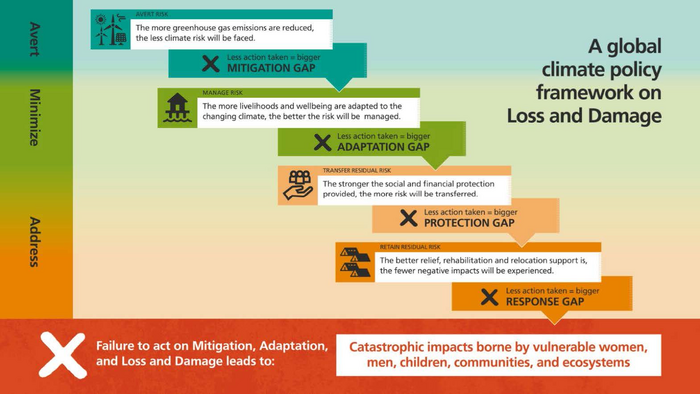With COP27 underway in Sharm El Sheikh, Egypt, the subject of climate-related losses and damages is once again expected to take center stage. IIASA contributed to a new policy brief by the Flood Resilience Alliance, of which IIASA is a member, which provides important facts, figures, and context that outline just how vital it is that progress is made on this issue.

Credit: Flood Resilience Alliance
With COP27 underway in Sharm El Sheikh, Egypt, the subject of climate-related losses and damages is once again expected to take center stage. IIASA contributed to a new policy brief by the Flood Resilience Alliance, of which IIASA is a member, which provides important facts, figures, and context that outline just how vital it is that progress is made on this issue.
While climate impacts continue to proliferate around the world, strongly affecting the most vulnerable, the policy debate on Loss&Damage remains contested between the Global North and South owing to unclear language and a lack of links to broader climate policy.
When considering actions to assist vulnerable communities affected by the impacts of climate change, we need to consider the full spectrum of averting, minimizing, and addressing losses and damages (see the figure below). So-called non-economic losses and damages – including losses of life, culture, and biodiversity, as well as threats to mental health and increased insecurity – further emphasize the need to avert and minimize losses and damages as much as possible, as some of their impacts are irreversible.
The policy brief, coauthored by Reinhard Mechler, who leads the Systemic Risk and Resilience Research Group in the IIASA Advancing Systems Analysis Program, lays out a framework that may sequentially accommodate negotiating positions and thus support policy formulation. It shows how gaps with regard to implementing climate mitigation and adaptation require attention to financial (insurance) and social protection (better access to social safety nets), as well as strong post-disaster event response.
“While financial protection in the form of subsidized disaster insurance has been largely offered by the Global North, the Global South has been heavily pushing for a Loss&Damage fund as a response mechanism. Further attention to social protection has been a common concern and thus may constitute that sweet spot to compromise on,” Mechler explains.
The brief (and an underlying report) further highlights that some vulnerable countries, such as Bangladesh, indeed have a plethora of social protection programs that some of the most climate vulnerable households have access to. Yet, few of these address climate events directly and thus fall short of protecting when disaster hits, thus creating an opportunity for climate policy to attend to this protection gap.
This issue gained much attention at COP26 last year, with significant pressure put on developed nations to set up a specific fund for addressing losses and damages. Ultimately this wasn’t successful, with the only agreement being to continue the discussions. Still, the so-called Glasgow Dialogue represents the first time that the need for finance for losses and damages has been recognized in a COP decision, and many countries will be pushing hard for tangible progress at this year’s meeting.
Recommendations included in the Flood Resilience Alliance’s briefing ahead of COP27 include:
- Closing the gaps that currently exist in this sphere, which will require massive investments and new approaches to prevent and manage avoidable losses and damages for the most vulnerable in society by increasing adaptation efforts. This will also require creating or strengthening comprehensive and shock-responsive social protection programs and, where appropriate, well-designed insurance schemes to ensure that the most vulnerable women, men, and children do not suffer the costs of the climate crisis where the means to adaptation are exhausted.
- Enhancing policymaking and implementation capacity by strengthening systems at all levels so that increased funding can be delivered effectively, in a way that is holistic rather than incremental, focuses on vulnerable locations and ecosystems, and meets the needs of the most vulnerable members of society.
- Investment is also required to build evidence in the form of more (and better) data on the scope of risks and impacts – economic, human, and ecological – and on the effectiveness of the policies and programs designed to minimize and address them. This must be developed in collaboration with communities, to better prepare them against climate-related hazards.
- Last, but not least, successful, locally led response mechanisms need to be scaled up. Global and national funds should finance the expansion of measures to address losses and damages that have proven to be effective, are locally led and meet the specific needs of the communities they support.
The policy brief and expertise of working with flood prone communities across the globe will be presented at a COP27 side event by the Zurich Flood Resilience Alliance NGO partners Mercy Corps, the International Federation of the Red Cross and Red Crescent Societies (IFRC), Concern Worldwide, and Plan International on Thursday, 10 November 2022.
Additional resources
Closing the gaps: A framework for understanding policies and actions to address Loss and Damage
Understanding loss and damage: an online explainer
A fair share of climate finance? An appraisal of past performance, future pledges and prospective contributors
About IIASA:
The International Institute for Applied Systems Analysis (IIASA) is an international scientific institute that conducts research into the critical issues of global environmental, economic, technological, and social change that we face in the twenty-first century. Our findings provide valuable options to policymakers to shape the future of our changing world. IIASA is independent and funded by prestigious research funding agencies in Africa, the Americas, Asia, and Europe. www.iiasa.ac.at
Article Publication Date
31-Oct-2022




